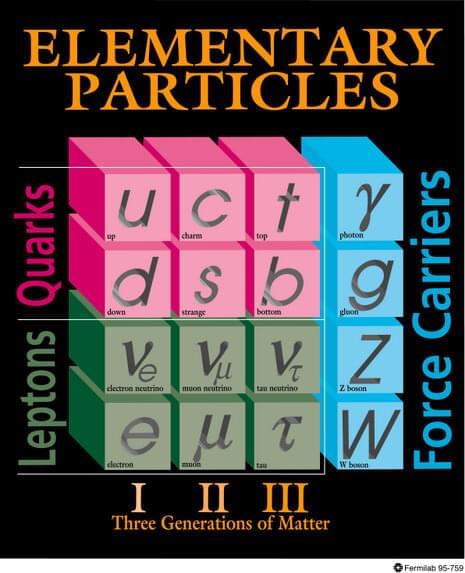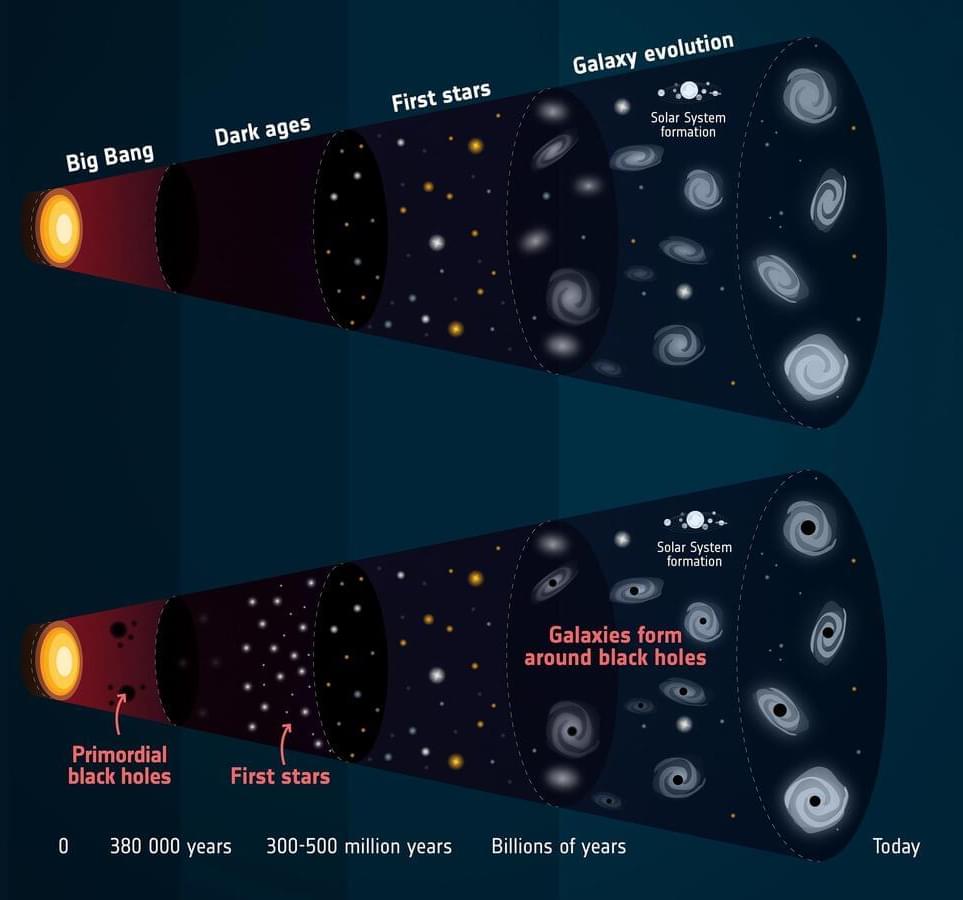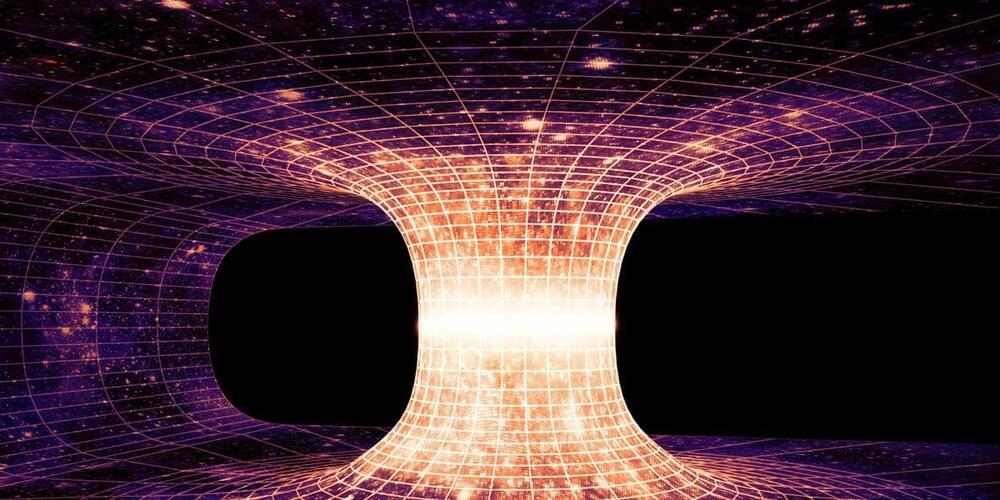Physicists are translating commonsense principles into strict mathematical constraints for how our universe must have behaved at the beginning of time.
Category: cosmology – Page 326
Video: 3D imaging reveals a supermassive black hole’s secrets
A zoom into M87’s monster black hole, thanks to Hubble.
The supermassive black hole located at the heart of the M87 galaxy is home to one of the most impressive natural patterns in nature.

Maybe ‘boson clouds’ could explain dark matter
The nature of dark matter continues to perplex astronomers. As the search for dark matter particles continues to turn up nothing, it’s tempting to throw out the dark matter model altogether, but indirect evidence for the stuff continues to be strong. So what is it? One team has an idea, and they’ve published the results of their first search.
The conditions of dark matter mean that it can’t be regular matter. Regular matter (atoms, molecules, and the like) easily absorbs and emits light. Even if dark matter were clouds of molecules so cold they emitted almost no light, they would still be visible by the light they absorb. They would appear like dark nebulae commonly seen near the galactic plane. But there aren’t nearly enough of them to account for the effects of dark matter we observe. We’ve also ruled out neutrinos. They don’t interact strongly with light, but neutrinos are a form of “hot” dark matter since neutrinos move at nearly the speed of light. We know that most dark matter must be sluggish, and therefore “cold.” So if dark matter is out there, it must be something else.
In this latest work, the authors argue that dark matter could be made of particles known as scalar bosons. All known matter can be placed in two large categories known as fermions and bosons. Which category a particle is in depends on a quantum property known as spin. Fermions such as electrons and quarks have fractional spin such as 1/2 or 3/2. Bosons such as photons have an integer spin such as 1 or 0. Any particle with a spin of 0 is a scalar boson.
Astronomers spy quartet of cavities from giant black holes
Scientists have found four enormous cavities, or bubbles, at the center of a galaxy cluster using NASA’s Chandra X-ray Observatory. This unusual set of features may have been caused by eruptions from two supermassive black holes closely orbiting each other.
Galaxy clusters are the largest structures in the universe held together by gravity. They are a mixture of hundreds or even thousands of individual galaxies, enormous amounts of hot gas, and unseen dark matter. The hot gas that pervades clusters contains much more mass than the galaxies themselves, and glows brightly in X-ray light that Chandra detects. An enormous galaxy is usually found at the center of a cluster.
A new Chandra study of the galaxy cluster known as RBS 797, located about 3.9 billion light-years from Earth, uncovered two separate pairs of cavities extending away from the center of the cluster.

Black Holes Could Be Dark Matter — And May Have Existed Since the Beginning of the Universe
Did black holes form immediately after the Big Bang? How did supermassive black holes form? What is dark matter? In an alternative model for how the Universe came to be, as compared to the ‘textbook’ history of the Universe, a team of astronomers propose that both of these cosmic mysteries could be explained by so-called ‘primordial black holes’. In the graphic, the focus is on comparing the timing of the appearance of the first black holes and stars, and is not meant to imply there are no black holes considered in the standard model. Credit: ESA.
Killing Stars
Visit our sponsor, Brilliant: https://brilliant.org/IsaacArthur/
When the largest of stars dies, the supernova they produce can outshine a whole galaxy, and potentially sterilize vast swathes of space. Future civilizations will need to be able to prevent or mitigate such events, though some might seek to artificially ignite a nova.
Visit our Website: http://www.isaacarthur.net.
Support us on Patreon: https://www.patreon.com/IsaacArthur.
Facebook Group: https://www.facebook.com/groups/1583992725237264/
Reddit: https://www.reddit.com/r/IsaacArthur/
Twitter: https://twitter.com/Isaac_A_Arthur on Twitter and RT our future content.
SFIA Discord Server: https://discord.gg/53GAShE
Listen or Download the audio of this episode from Soundcloud:
Episode’s Audio-only version: https://soundcloud.com/isaac-arthur-148927746/killing-stars.
Episode’s Narration-only version: https://soundcloud.com/isaac-arthur-148927746/killing-stars-narration-only.
Credits:
Killing Stars.
Science & Futurism with Isaac Arthur.
Episode 281; March 11, 2021
Written, produced & narrated by isaac arthur.
Script Editors:
Fleet of Stars
Start listening with a 30-day Audible trial and your first audiobook plus two Audible Originals are free. Visit.
http://www.audible.com/isaac or text “ISAAC” to 500–500.
Interstellar travel is very time consuming, moving from star to star, but perhaps we could use stars themselves as spaceships, and move whole solar systems or even galaxies.
Today we’ll look at how to use Shkadov Thrusters, novas, supernovae, black holes and quasars to move through space, literal starships.
Visit our Website: http://www.isaacarthur.net.
Support us on Patreon: https://www.patreon.com/IsaacArthur.
SFIA Merchandise available: https://www.signil.com/sfia/
Social Media:
Facebook Group: https://www.facebook.com/groups/1583992725237264/
Reddit: https://www.reddit.com/r/IsaacArthur/
Twitter: https://twitter.com/Isaac_A_Arthur on Twitter and RT our future content.
SFIA Discord Server: https://discord.gg/53GAShE
Listen or Download the audio of this episode from Soundcloud: Episode’s Audio-only version: https://soundcloud.com/isaac-arthur-148927746/fleet-of-stars.
Episode’s Narration-only version: https://soundcloud.com/isaac-arthur-148927746/fleet-of-stars-narration-only.
Credits:
Generation Ships: Fleet of Stars.
Episode 186, Season 5 E20
Written by:

The Universe Might Be Able to Bend the Laws of Physics All By Itself
At this point, the paper mingles cosmology, or the study of the universe and its origins, with biology. “We ask whether there might be a mechanism woven into the fabric of the natural world, by means of which the universe could learn its laws,” the authors write. In other words, a universal law might transcend all scientific fields. That means that the laws of physics, as we know them, could be subject to higher-order laws of the universe that control them—and that we can’t even comprehend.
“Exploring links between fields is crucial because knowledge is not fundamentally compartmentalized,” says Bruce Bassett, professor at the University of Cape Town’s Department of Mathematics and head of the Cosmology Group at the African Institute of Mathematical Sciences in South Africa. We humans are simply narrow-minded. “We segment and compress knowledge into biology, and physics, and sociology because of our limited brains, and the cost of that segmentation and compression is that we easily miss the commonalities and hidden universality between branches of human knowledge.”
Evidence for Parallel Universes — Max Tegmark / Serious Science
Physicist Max Tegmark on predictions that cannot be observed, explanation of Universe’ fine tuning, and quantum computer.
You can now become our Patron and help us communicate science to a wider audience. Support us on https://www.patreon.com/SeriousScience.
Be the first to find out about our new videos and articles. Learn interesting facts about various topics and people. Discover the answers to the big questions. Be in the know.
Follow us:
Serious Science — http://serious-science.org/videos/1435
Patreon — https://www.patreon.com/SeriousScience.
Facebook — https://www.facebook.com/serious.scie…
Twitter — https://twitter.com/scienceserious.
Instagram — https://www.instagram.com/serious.sci…
Tumblr — http://serious-science.tumblr.com/
Vk — https://vk.com/seriousscience

Quantum-circuit black hole lasers
A black hole laser in analogues of gravity amplifies Hawking radiation, which is unlikely to be measured in real black holes, and makes it observable. There have been proposals to realize such black hole lasers in various systems. However, no progress has been made in electric circuits for a long time, despite their many advantages such as high-precision electromagnetic wave detection. Here we propose a black hole laser in Josephson transmission lines incorporating metamaterial elements capable of producing Hawking-pair propagation modes and a Kerr nonlinearity due to the Josephson nonlinear inductance. A single dark soliton obeying the nonlinear Schrödinger equation produces a black hole-white hole horizon pair that acts as a laser cavity through a change in the refractive index due to the Kerr effect.